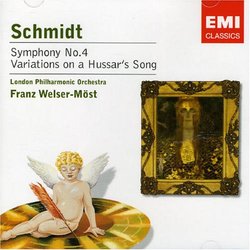| All Artists: Franz Schmidt, Franz Welser-Möst, London Philharmonic Orchestra Title: Schmidt: Symphony No. 4; Variations on a Hussar's Song Members Wishing: 0 Total Copies: 0 Label: EMI Classics Original Release Date: 1/1/2006 Re-Release Date: 6/12/2006 Genre: Classical Styles: Historical Periods, Modern, 20th, & 21st Century, Symphonies Number of Discs: 1 SwapaCD Credits: 1 UPC: 094635569322 |
Search - Franz Schmidt, Franz Welser-Möst, London Philharmonic Orchestra :: Schmidt: Symphony No. 4; Variations on a Hussar's Song
 | Franz Schmidt, Franz Welser-Möst, London Philharmonic Orchestra Schmidt: Symphony No. 4; Variations on a Hussar's Song Genre: Classical
|
Larger Image |
CD DetailsSimilar CDs
|
CD ReviewsOne of my most valued CDs. Michael E. Farman | somewhere in the USA | 02/12/2008 (5 out of 5 stars) "This symphony should be better known. In my opinion, it's one of the great symphonies of the 20th century. Also one of the saddest, since it was composed after the death of Schmidt's beloved daughter, who died giving birth. It's by way of being a requiem for her. The first movement is chromatic and turbulent, rising to a truly shattering climax. The second begins and ends with a beautifully lamenting cello solo (the composer had been a cellist in the Vienna Symphony Orchestra). The middle section is a funeral march, again reaching another devastating climax. In the third movement (scherzo) he seems to portray a desperate attempt to return to "normal" activity, but interrupted by the persisitent intrusion of material from the previous movements, ending in a complete collapse. The final movement returns to the first, completing the circle with the trumpet solo that began the work, ending with the finality of grief that can never be healed. The symphony is superbly played by the LSO under the baton of Welser-most. It'd hard to see how this performance could be improved on. Perhaps their task is made easier by Scmidt's masterly orchestration. Highly recommended to anyone who is interested in tonal 20th century music." Very Fine Performance of a Late Romantic Masterpiece Moldyoldie | Motown, USA | 02/17/2009 (5 out of 5 stars) "There's no doubt in my mind that Franz Schmidt's Symphony No. 4 of 1933 is a true masterpiece of Late Romantic expression; its incredible inspiration draws from personal tragedy (death of the composer's adult daughter) and manifests itself in a most exquisite extended interweaving of unbroken melodic and harmonic lines across four uninterrupted movements. My sole recording till this one was that of the Vienna Philharmonic under Zubin Mehta. In my review of that recording, I stated: "I've yet to hear another recording of this work...the presumptuous feeling here is it really isn't necessary as conductor Zubin Mehta and the Vienna Philharmonic convey the full measure of this work and the warm, early '70s analog recording is exemplary." After hearing this fine Gramophone Award-winning release from Franz Welser-Möst and the London Philharmonic, my feelings remain unchanged as I don't think there's much to choose between the two, other than perhaps the couplings. I see the Mehta is also available coupled with his acclaimed recording of the Mahler Resurrection Symphony.
Welser-Möst/LPO certainly deserve a great deal of credit for their dedicated and committed performance here. Even though their timings come in considerably faster than Mehta/VPO, the overall impression is hardly one of speed and haste; the extended lines are held expressively taut throughout with fine ensemble and dynamic balance. If the Mehta perhaps offers up a bit more bittersweet languor and lush playing, Welser-Möst and the LPO still invest the work with that necessary tinge of heavyhearted optimism to underlie the tragedy - in my opinion, so important to a successful performance of this lengthy, unbroken expression. Both recordings are thoroughly recommendable. As to the fill-up here, Variations on a Hussar's Song is a mostly delightful and contrasting multi-part makeweight in a somewhat similar idiom; it's probably a worthy listen for the dedicated initiate into the music of Schmidt. Schmidt: Symphony No. 4 / Schoenberg: Chamber Symphony No. 1 Mahler: Symphony No.2/ Schmidt: Symphony No.4" |

 Track Listings (11) - Disc #1
Track Listings (11) - Disc #1
